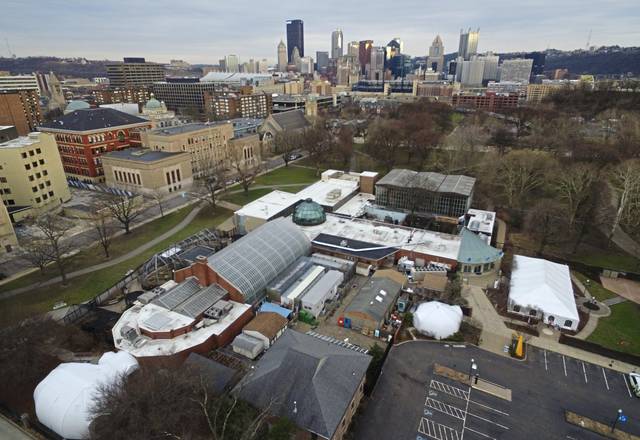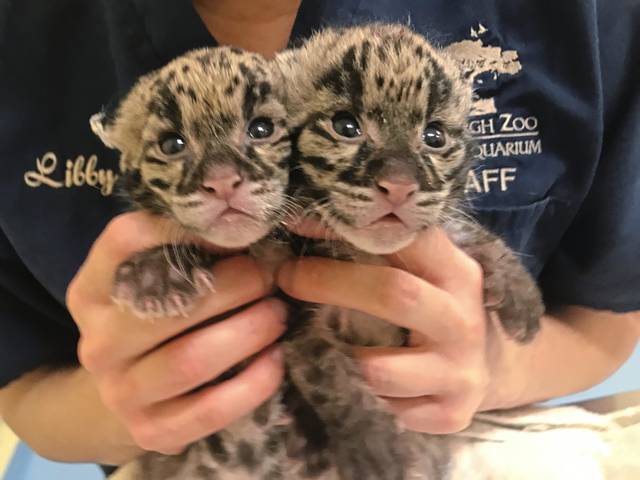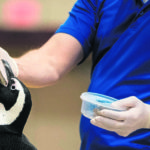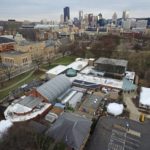Most of the National Aviary’s nearly 500 birds wake as the sun comes up.
So veterinarians and other animal care staffers arrived at the North Side facility around 7 a.m. Monday, about 15 minutes before sunrise, to begin making their daily rounds.
Some checked up on specific birds, paying close attention to those with special needs and geriatric issues.
Others prepared and fed specially curated food to the likes of African penguins, Hyacinth macaws and Andean condors.
By 7:30 a.m., more workers arrived and set to cleaning the Aviary’s various habitats — the tropical rainforest, the wetlands, Penguin Point. They refilled ponds and drinking pools with fresh water.
Most of Pennsylvania’s businesses had shut down physical operations by Monday morning in a statewide effort to thwart the spread of the coronavirus pandemic, and, like other attractions and museums, the National Aviary closed to the public earlier this month.
Still, dozens of employees continue to carry out the life-sustaining roles of caring for the 500 birds and mammals representing more than 150 species that live there.
“We are committed to caring for them, and we can’t compromise on the care they receive,” said Molly Toth, spokeswoman for the National Aviary, the only independent indoor nonprofit aviary in the United States and largest such facility in the nation.
The Aviary already furloughed workers in visitor services because of the shutdown.
“Right now, we are just working with our essential staff,” Toth said. “We are operating with essentially a skeleton crew at this time. … But we have enough people to cover all of the bases.”
Caring for animals during a pandemic
Attractions such as the Aviary and the Pittsburgh Zoo & PPG Aquarium face the added challenge of paying for the fixed costs and payroll required to keep animals and their caretakers safe and healthy during the pandemic.
“Each bird gets individualized care, their meals every day and they get some interaction with our staff,” Toth said.
Maintaining normal operations for the animals will get tougher the longer the shutdown goes on.
“During this time, our dedicated caretakers and veterinarians are continuing to provide the highest standards of professional care and welfare for our animals on site,” officials told donors in an alert on the Pittsburgh Zoo’s website. “However, as the situation heightens and we remain closed to guests, our needs continue to grow. As a nonprofit organization, we rely on visitor admission to sustain our mission.”
Earned revenue — such as admission, animal encounters and gift shop sales — makes up about 60% of the Aviary’s annual budget.
“And with our doors closed, we have lost that income,” Toth said. “We are looking at every possible way to operate. About 25% percent of our budget comes from generous donors, corporations, and foundations, and philanthropy, too, is being affected by the economic circumstances.”
We miss seeing all of you at the National Aviary! Thatâs why weâre working on ways to get our visitors and members access to behind-the-scenes videos, bird-friendly educational content, animal photos, and more! #closedbutstillcaring pic.twitter.com/B8ZDkGzaTX
— National Aviary (@National_Aviary) March 17, 2020
Extra steps to keep animals, caretakers safe
About half the staffs of both organizations — roles that don’t involve direct contact with animals — are working from home.
Those that continue to work are taking extra precautions to keep from infecting fellow workers with covid-19, the respiratory disease caused by the new coronavirus.
At the Zoo, the veterinary staff has split into two teams to ensure that if someone gets infected on one team, that team can quarantine while the other group continues working, said Dr. Ginger Sturgeon, the Pittsburgh Zoo’s director of animal health.
The 25 to 30 zookeepers who work daily are being asked to wear special gloves and not to mingle with other sections of the zoo or eat with other employees in shared spaces such as break rooms.
The Zoo canceled some preventive veterinary care, such as routine exams, hoof tread checks on donkeys and non-urgent vaccinations.
Zoo employees have sewn some of their own face masks to lessen the need to buy more surgical ones.
They have a ventilator on site and have alerted local health officials to its availability should the need arise. Drive-thru covid-19 testing at the Zoo’s main parking lot has not interfered with animal care operations, Sturgeon said.
Supply chain issues have not yet posed a problem, but the Zoo has ordered extra food to keep from running low, including specialized grains, frozen seafood and meats and biscuits for primates, Sturgeon said.
Like the Aviary, the Pittsburgh Zoo is exploring online education options for children during the shutdown and plans to continue sharing glimpses into lives of its animals via social media.
Last week, the Zoo shared a video on Twitter celebrating the third birthday of Kesi the rhinoceros.
“It’s to remind people there’s still good things, cute things that are happening out in this world to give us all a sense of normalcy during these unprecedented times,” Sturgeon said.
Despite the Zoo being closed, our keepers are still celebrating. Happy 3rd birthday sweet Kesi! ð pic.twitter.com/f2Oo2jfRNh
— Pittsburgh Zoo & PPG Aquarium (@PghZoo) March 17, 2020
RAD ‘not in a position’ to help
Both the Zoo and Aviary have been deemed cultural assets by the Allegheny Regional Asset District, among their major funders.
But because RAD’s roughly $100 million annual budget is funded by sales taxes, the body does not anticipate being able to provide additional relief to struggling assets during the shutdown.
“As our revenue comes from sales tax, we anticipate a significant impact as a result of the covid-19 crisis,” RAD spokeswoman Shannon Musgrave said Monday afternoon by email. “We will utilize the grant stabilization reserve in hopes of maintaining a steady stream of operational funding for our assets, but we are not in a position to make or designate emergency funds on top of our already pledged 2020 grants.
“While we are incredibly concerned for our assets as we face this unprecedented time together, we are encouraged by the creativity and collaboration across our cultural community,” Musgrave said. “We are hopeful that we’ll get through this together and, when we come out on the other side, RAD’s steadfast support will remain.”
Both the Aviary and Zoo are asking for donations if individuals can spare money to offset the loss in revenue, saying even small contributions or renewing an annual membership will help.
To donate to the Zoo, visit PittsburghZoo.org.
To donate to the Aviary, visit Aviary.org or call 412-258-9433.
We canât mingle right now, but at least we can still FLAMINGLE! ð¦©
We are a nonprofit that heavily relies on visitors to continue our mission. Please consider supporting the Zoo during this difficult time. 𥰠https://t.co/MfmDxMzizT pic.twitter.com/5zUvQxK6IV















